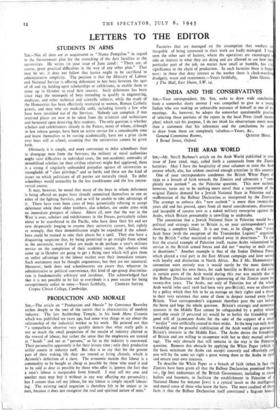LETTERS TO THE EDITOR
STUDENTS IN ARMS SIR,—Not all dons are as acquiescent as " Numa Pompilius " in regard to the Government plan for the restocking of the Arts faculties at the universities. He writes (in your issue of June 22nd): "There are, of course, great practical difficulties in the way of any other plan." That may be so: it does not follow that justice ought to be sacrificed to administrative simplicity. The position is that the Ministry of Labour and National Service is offering deferment to 600 boys between the ages of a and 19, holding open scholarships or exhibitions, to enable them to come up in October to read Arts courses. Such deferment has been since 1943 the monopoly of boys intending to qualify in engineering, medicine, and other technical and scientific subjects, while the study of the Humanities has been effectively restricted to women, Roman Catholic priests, and men who are medically unfit, including latterly a few who have been invalided out of the Services. Nobody can complain if 600 reserved places are now to be taken from the scientists and technicians and bestowed upon deserving Arts students. The only question is whether scholars and exhibitioners already in the Forces, many of whom, although in low release groups, have been on active service for a considerable time and know themselves to be rusting academically, have not a prior claim over boys still at school, assuming that the universities cannot be given both.
Obviously it is simple, and more convenient to defer schoolboys than to disengage men from the Services; the military or naval authorities might raise difficulties in individual cases, the non-academic comrades of demobilised scholars (or their civilian relatives) might feel aggrieved, there is a strong if singularly unfounded prejudice against all universities as strongholds of " class privilege," and so forth; and these are the kind of issues on which politicians of all parties are naturally timid. To defer schoolboys would ostensibly be the less troublesome and the less contro- versial course.
It may, however, be noted that many of the boys to whom deferment is being offered on paper have already committed themselves to one or other of the fighting Services, and so will be unable to take advantage of it. There have even been cases of boys quixotically refusing to accept deferment while their older brothers, also scholars, are under arms with no immediate prospect of release. Above all, now that the war in the West is over, scholars and exhibitioners in the Forces, particularly sailors about to be transferred to the Pacific, who have done their bit and are now desperately longing to resume their university careers, feel, rightly or wrongly, that their demobilisation might be expedited if the school- boys could be trained to take their places for a spell. They also have a disquieting suspicion that, by being permitted to go straight from school to the university, even if they are made to do perhaps a year's military service on the completion of their academic course, the scholars who come up in October are going to get a flying start which will give them an unfair advantage in the labour market over their immediate seniors. Such sentiments may be thought ungenerous, but they are not unnatural. Moreover, both dons and schoolmasters are aware that, whatever its administrative or political convenience, this kind of age-group discrimina- tion is fundamentally arbitrary and invidious. The acknowledged fact that it is not possible to be fair to everybody is a poor excuse for being
surreptitiously unfair to some.—Yours faithfully, CHARLES SMYTH. Corpus Christi College, Cambridge.




























 Previous page
Previous page